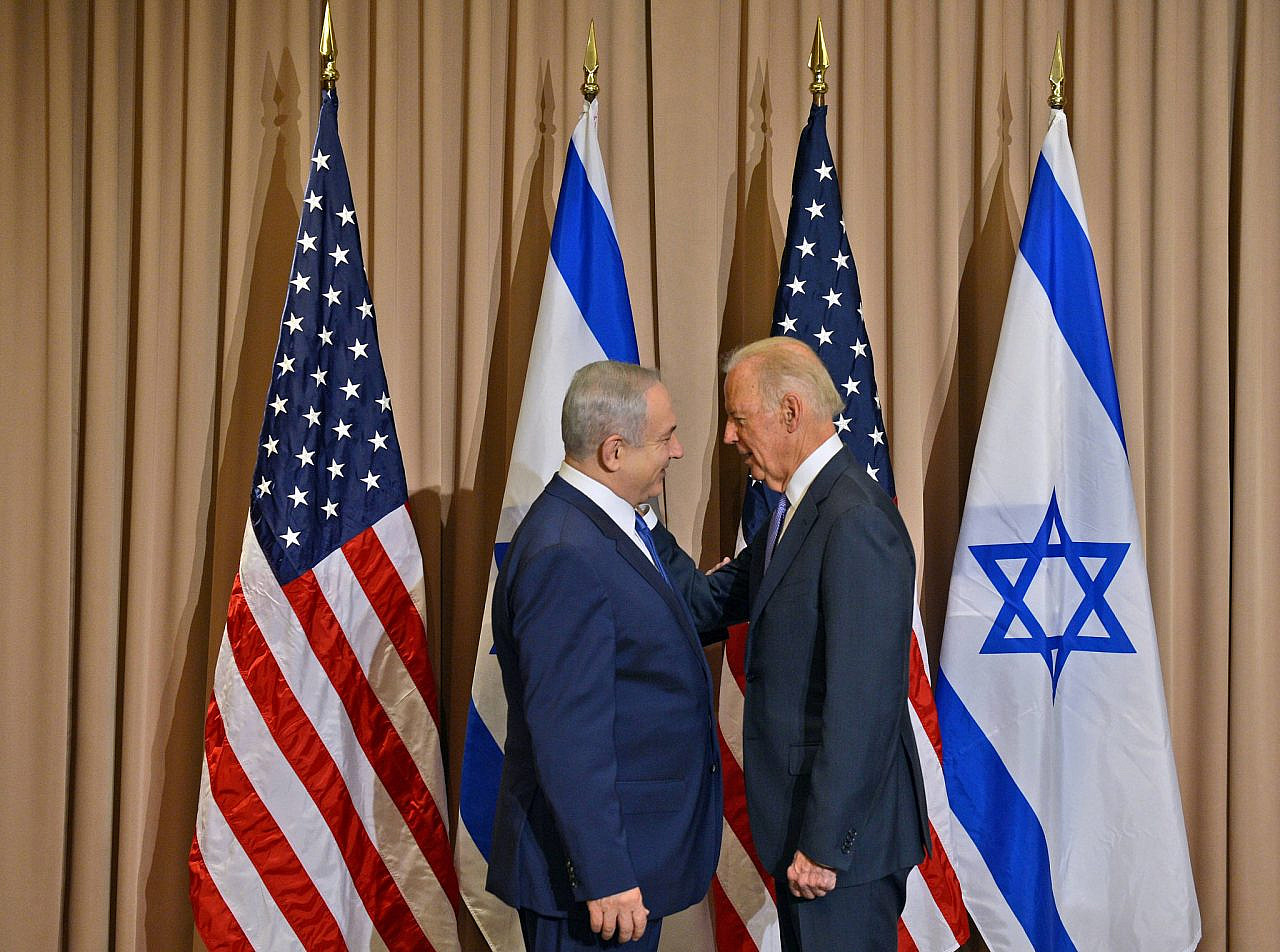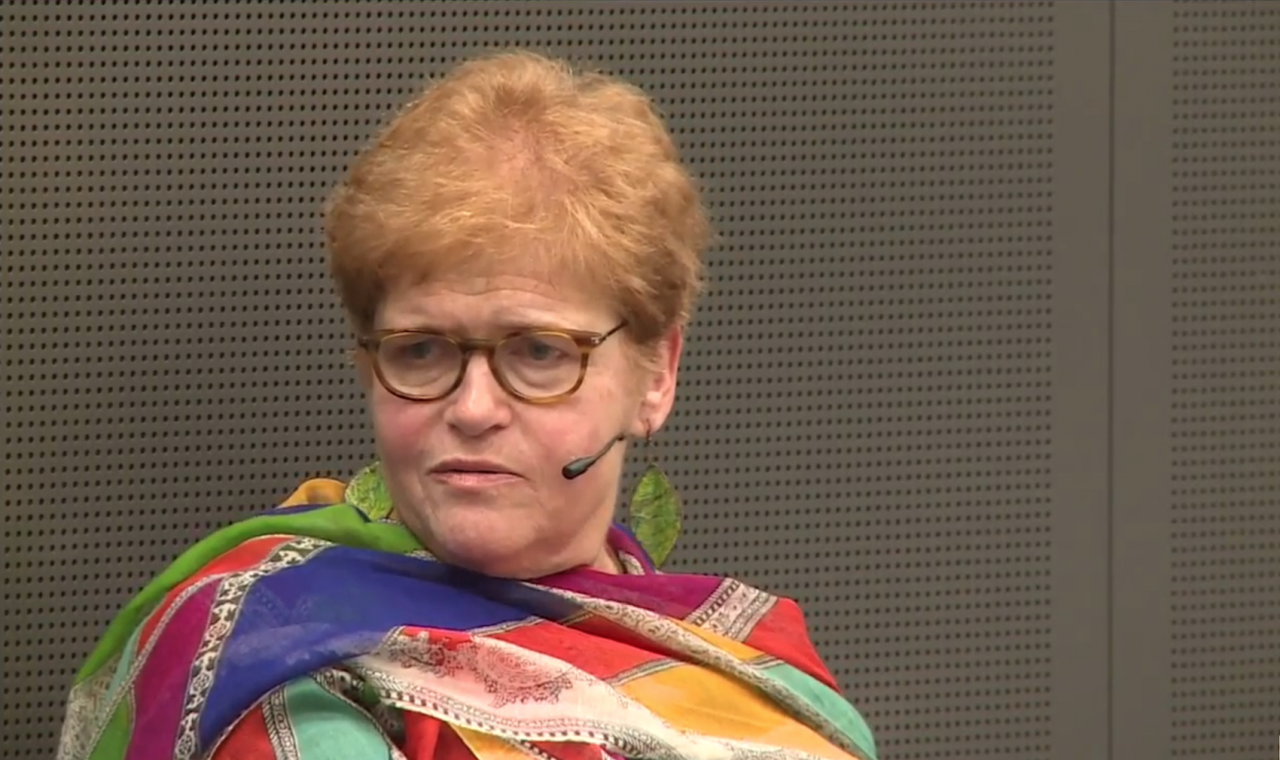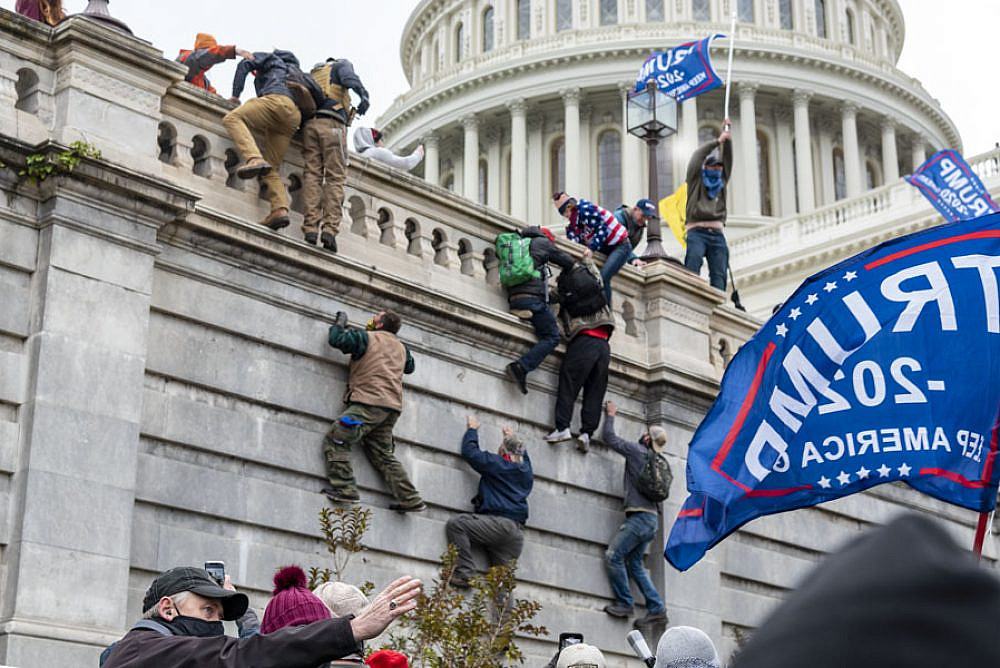The violent insurrection at the U.S. Capitol on Jan. 6 was both shocking and predictable. Shocking because of the way it unfolded, with President Donald Trump inciting thousands to march on the building as Congress held a joint session to certify the results of the election. Predictable, because U.S. fascism has been flourishing openly these past five years under Trump, coddled and encouraged by the president and his collaborators in the White House and the Republican Party.
From Charlottesville to Pittsburgh to El Paso to Nashville, white supremacists and neo-Nazis have shown and told us exactly who they are, what they believe, and what they plan to do. As they strolled around the Capitol on Jan. 6, taking selfies with police and hoisting the Trump Campaign’s flag, some proudly displayed Nazi tattoos and flew Nazi flags. Outside of the Capitol, one group of protestors erected gallows and hung a noose.
For the various far-right groups aligned around Trump — from QAnon to the Oath Keepers — what happened in the Capitol is just one battle in a larger, ongoing war. For this reason, it is imperative that the Joe Biden administration swiftly and forcefully wield every legal and political tool available to not only go after the hundreds of individuals who were involved in last week’s attempted coup (and members of the police who aided them), but to dismantle the entire growing white supremacist and white nationalist infrastructure.
It is heartening and important to see Biden nominate leading civil rights attorneys such as Vanita Gupta and Kristen Clarke for high level roles in the Justice Department; they will be vital to heading this effort and reversing the corrosive impacts of Trump and his Attorney General Willian Barr.
But there is another department that the Biden transition team should look to in this fight: the Office of the Special Envoy to Monitor and Combat Antisemitism, a body created by the 2004 Global Anti-Semitism Review Act that operates under the State Department.
Rejecting the ‘both sides’ approach
Over the past decade, there has been a vocal split within the Jewish community around what constitutes antisemitism and how best to fight it. Established Jewish organizations such as the Anti-Defamation League (ADL) and the Jewish Federations of North America (JFNA), as well as newer groups they have supported like the Israel on Campus Coalition and Zioness, have become increasingly focused on — one might say obsessed with — criticism of Israel and what they describe as “antisemitism on the left.”
But these groups, long accustomed to serving as the arbiters of what constitutes antisemitism, now face an emerging set of center-left and progressive Jewish (and non-Jewish) organizations and leaders — from Bend the Arc and IfNotNow to Political Research Associates and Eric Ward. These emerging voices are challenging the Jewish community’s perspectives and policies, situating the fight against antisemitism, and the desire for Jewish safety, within broader multiracial movements as well as the wider call for justice and equality. The rise of ethnonationalist governments in the United States and around the world has served to popularize and bolster this movement’s arguments.
In appointing a new Special Envoy on Antisemitism, the Biden administration will be staking out its own position within this split worldview. The appointment is an opportunity to listen to and follow the leadership of this younger and significantly more diverse generation of activists that is steeped in the major social justice fights of our time. It should also be a moment for the administration to reject the cynical “both sides” approach of the old guard — an approach that repeatedly treats the nonviolent Boycott, Divestment, and Sanctions (BDS) movement and their supporters as an equal, if not greater, threat to Jews as the violence we saw at the Capitol.

Unfortunately, Biden’s current shortlist of nominees fails to take this bold opportunity, offering a list of names as predictable as it is disappointing.
It includes former ADL National Director and noted Islamophobe Abe Foxman — a man whose tenure there included opposition to the Park 51 project (the so-called Ground Zero mosque); support for blanket surveillance of Muslim communities in the United States; and attacking Israel critics, from J Street to the BDS movement. It also includes current ADL senior vice president and Democratic donor, Sharon Nazarian. The incoming administration should know that nominating anyone from the ADL — past or present, but especially Foxman — would elicit enormous outrage from both Jewish and non-Jewish progressives.
That is perhaps why the most likely contender for the envoy position, according to people familiar with the process who I spoke with, is the more moderate Deborah Lipstadt, a professor of modern Jewish history at Emory University and a scholar of antisemitism and the Holocaust. (Lipstadt is widely known for being sued by Holocaust denier David Irving, a high profile case that was later dramatized in the 2016 film “Denial”).
As a high-profile speaker on antisemitism, one can see why Lipstadt came to top the list for special envoy. But there are reasons to be concerned.
On Jan. 6, while neo-Nazis and white supremacists paraded through the halls of the Capitol, Lipstadt posted a tweet that showed why even she would be a regrettable choice for progressives: “Note the t-shirt: Camp Auschwitz. There is antisemitism on the left, for sure, but it [sic] there on the right too,” she tweeted.
The tweet was met with immediate derision and anger. Why had she seen this as an appropriate time to point a finger at the left, when what was playing out in the Capitol was so clearly the work of the far right?

In response to this criticism, Lipstadt explained she was misunderstood and that she had phrased the comment so that her right-wing Jewish audience might better receive it. Perhaps so. But if this tactic is needed to convince any Jewish group that a man wearing a Camp Auschwitz t-shirt amid a sea of Nazi insignias and white supremacist symbols is a danger, are they really worth appealing to? Rather, Lipstadt’s instinct to assuage this audience by punching left shows a troubling lack of judgement and misplaced priorities — problems that were also reflected in her most recent book, “Antisemitism: Here and Now.”
By employing the “both sides” framework in a moment that required singular moral clarity, Lipstadt not only minimized the gravity of the violence we were witnessing, but gave credence to those voices claiming there is no difference between the Capitol riot and the Black Lives Matter protests last summer. This has been a familiar pattern when it comes to Jewish communal responses to antisemitic and nationalist violence: acknowledge and condemn antisemitism on the right, but not without underlining the pressing concerns about “antisemitism on the left.”
Indeed just one week after Jan. 6, the heads of the Conference of Presidents, the ADL, and Hadassah, among others, wrote a letter to the Biden administration focused almost entirely on the threat of antisemitism on campus. The letter was part of an ongoing and controversial effort to enshrine the International Holocaust Remembrance Alliance’s working definition of antisemitism into law — something the IHRA’s original author himself opposes.
Antisemitism cannot be fought alone
Lipstadt’s comment is of course unlikely to disqualify her from the role of special envoy. But it can and should provoke those of us who want to see the next administration take up antisemitism effectively to voice our expectations; that the person appointed for the role can identify and discern the biggest threats facing Jews in the United States, and build effective coalitions and partnerships with other threatened groups to address them.
This is especially true given that the next envoy will be joining a State Department that, under State Secretary Mike Pompeo, officially designated anti-Zionism as akin to antisemitism — a blatant assault on all supporters of Palestinian rights.
Indeed, the person who takes over from the current special envoy, Elan Carr, should be ready not only to rebuke Trump’s policies, but to fundamentally redirect the office to reject the “both sides” framework in toto. They must understand that antisemitism at its core is neither left nor right, and that conflating criticism of Israel and/or support for BDS with antisemitism hinders efforts to address antisemitism when it does show up in leftist circles — and more dangerously obscures actual threats to Jews.
After the massacre at the Tree of Life Synagogue in Pittsburgh, Black leaders Rev. Jennifer Bailey and the Working Families Party’s Maurice Mitchell penned op-eds with Jewish leaders Dove Kent and Dania Rajendra to condemn the attack, and to express and renew their shared commitment to tackling antisemitism, white nationalism and white supremacy together. It was a recognition that antisemitism can neither be fought alone nor treated as a stand alone issue. The next Special Envoy of Monitoring and Combating Antisemitism should understand this, too.
The Biden administration has shown — in its approach to the climate crisis, for example — that it is willing to learn from and listen to the new generation of leaders that has brought fresh urgency and a new framework to addressing today’s pressing challenges. They have the opportunity to do the same with antisemitism.
Right now, though, the current nominees are not up to the task.

